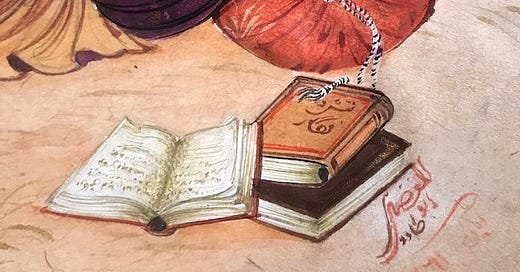I recently discovered the Persian poet, Hafiz, who writes stunning poetry about love — and what better time than to share his poetry than the month of love.
Poetry has always been illusive for me — Able to capture my attention only at particular moments and if done in a particular way. More times, it feels distant and leaves me confused.
To be honest, I find it difficult to understand very abstract poetry.
That’s why when I discovered Hafiz, who’s poetry is lyrical, metaphorical and symbolic - I was able to savor and allow it to speak to me.
I hope it does the same for you.
The Rose by Hafiz
How did the rose
dare open her heart
and give to the world
all her beauty?
She felt the encouragement of light
against her being.
Otherwise,
we all remain
too frightened.
From The Gift, Poems by Hafiz, translated by Daniel Ladinsky
When I went to research more about Hafiz, I found out that he was a contemporary of Rumi. He lived from 1326–1390 and became an iconic figure in Islamic literature. He was known for his profound mystical wisdom combined with a sublime sensuousness. Hafiz also mastered the poetic form known as the ghazal (pronounced "guzzle"), an ode or song consisting of rhymed couplets celebrating divine love.
Through his selection of poems from the book “Drunk on the wine of the beloved” he evokes drunkenness and intoxications as metaphors for overflowing love and joyful abandon. We all hope to have the experience of being in gleeful abandon, in feeling free and uninhibited around someone we love.
I am drunk on the wine of the Beloved,
And I know not where I am or who I am.
My heart is lost in the ocean of love,
And I am drowned in the waves of ecstasy.
When I went to discover more of his poetry, I was delightfully surprised that not all of it was heavy, but had humor and even teasing, a lightness that somehow made the reader feel a little closer to the poet.
With the following poem, “Look at this Beauty,” it’s as if Hafiz himself knew that poetry is about the experience, being present with the words, and not the words themselves.
The beauty of this poem is beyond words.
Do you need a guide to experience the heat of the sun?
Blessed is the brush of the painter who paints
Such beautiful pictures for his virgin bride.
Look at this beauty. There is no reason for what you see.
Experience its grace. Even in nature there is nothing so fine.
Either this poem is a miracle, or some sort of magic trick.
Guided either by Gabriel or the Invisible Voice, inside.
No one, not even Hafiz, can describe with words the Great Mystery.
No one knows in which shell the priceless pearl does hide.
– Translation by Thomas Rain Crowe
In this case, why does some poetry move us and some poetry leave us blank?
In search of answers, I picked up the book, “Poetry and Story Therapy” by Geri Giebel Chavis. In the book she quotes Elizabeth Drew, who explains why poetry and some in particular can have such effects on us.
“The Poets find the right words in the right order for what we already dimly and dumbly feel, and they also fertilize in our consciousness responses which were lyng inert and cloddish.”
This idea that we already have certain emotions within us, and words can help those emotions bubble up to the surface makes total sense. That’s why I guess I believe so much in biblio/poetry therapy.
Words are powerful and the meaning we assign to them can be spontaneous and instant.
The more we read, the more we can have these cathartic experiences.
I dare say that most of us have had a poem which moved us — if that’s the case, feel free to share it in the comments so we can all delight in it.
See you next week,
xx Toni
PS: If you want to learn more about Bibliotherapy or to jump in and schedule a bibliotherapy session with me, you can do that here.




